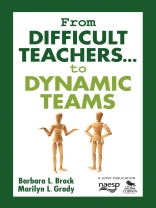‘This book reflects a true understanding of the different personalities administrators face and clearly outlines what each leader can do to establish a positive environment for their employees and students. This is one book no administrator should be without.’
—Patricia Bowman, Retired Principal, Los Angeles Unified School District
Adjunct Professor, University of California, Los Angeles
Proven solutions for toxic behaviors!
Unconstructive staff behaviors can disrupt a thriving school environment. School leaders need positive, generative communication strategies that can defuse negativity and inspire teachers to change their behavior and become contributing members of the learning community.
From Difficult Teachers…to Dynamic Teamwork examines the underlying basis of problematic behaviors and provides proactive, proven strategies for building teamwork and a positive school culture. Leaders will discover strategies for enhancing their interpersonal skills, determining if their own behavior is contributing to the problem, and encouraging behavior change in teachers and staff. Based on interviews with more than 50 experienced principals, this valuable resource connects content to practice via:
- Key tools, practical resources, organizational charts, and behavior assessment forms
- Sage advice and quotations from experienced educators
- Sample dialogues to help identify behavior challenges
- ‘Take Action’ sections for specific implementation strategies
Maximize the effectiveness of your staff by building a culture of shared leadership, collegiality, and teamwork!
Tabella dei contenuti
Introduction
Acknowledgments
About the Authors
Part I. Identification and Understanding
1. Understanding Difficult Teachers
Who Are They?
How Did They Get This Way?
What Do Difficult Teachers Want?
The Effects of Difficult Teachers
2. Difficult Teachers, Difficult Behaviors
Chronic Comnplainers
Negative Teachers
Inflexible Teachers
Noncompliant
Gossipers
Anarchists
Snipers
Bullies
Noisemakers
Selfish Teachers
Part II. Solutions and Strategies
3. Facilitating Behavior Change: Conversations, Warnings, and Improvement Plans
Before a Problem Occurs
How to Encourage Behavior Change
When Conversations Fail
4. Am I Contributing to the Problem?
Why Are Some Principals ‘Difficult’?
Could Your Behavior Be Considered Difficult?
Fertile Ground for Difficult Teachers
Gender-Related Differences in Difficult Behaviors
Strategies for Change
Part III. Prevention
5. Interpersonal Skills That Help
Listening to Understand
Speaking for Understanding
Body Language
Defusing Emotionally Charged Conversations
6. Creating a Culture of Teamwork
Building a Positive Culture
Focusing on Positive Teachers
Creating a Spirit of Teamwork
Rewarding Positive People
References
Resources
Index
Circa l’autore
Marilyn L. Grady, is professor of educational administration at the University of Nebraska-Lincoln (UNL). She is the author or coauthor of 23 books, including From Difficult Teachers to Dynamic Teamwork (2009) with Brock, Getting it Right from the Start (2009) with Kostelnik From First Year to First Rate (2007) with Brock, 194 High-Impact Letters for Busy Principals (2006), 20 Biggest Mistakes Principals Make and How to Avoid Them (2004) and Launching Your First Principalship (2004) with Brock. Her research areas include leadership, the principalship, and superintendent-board relations. She has more than 175 publications to her credit. She is the editor of the Journal of Women in Educational Leadership. Her editorial board service has included Educational Administration Quarterly, International Studies in Educational Administration, International Journal of Learning, Rural Educator, Journal of At-Risk Issues, Journal of School Leadership, Advancing Women in Leadership On-Line Journal, Journal for Rural School and Community Renewal, International Journal of Learning, and Journal for a Just and Caring Education. She is the recipient of the Stanley Brzezinski Research Award, NCPEA’s Living Legend Award, the Donald R. and Mary Lee Swanson Award for Teaching Excellence, UNL’s Distinguished Teaching Award, and UNL’s Award for Outstanding Contributions to the Status of Women.Grady coordinates an annual conference on women in educational leadership that attracts national attendance and is in its 24th year. She has been an administrator in K-12 schools as well as at the college and university levels. She received her bachelor’s degree in history from Saint Mary’s College, Notre Dame, Indiana, and her doctorate in educational administration with a specialty in leadership from The Ohio State University.












